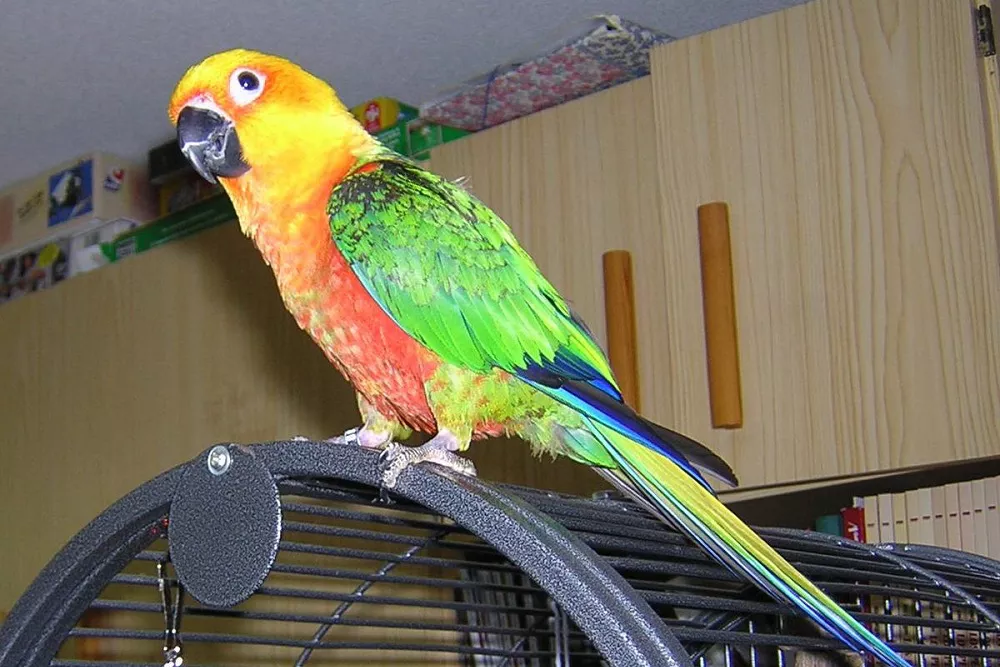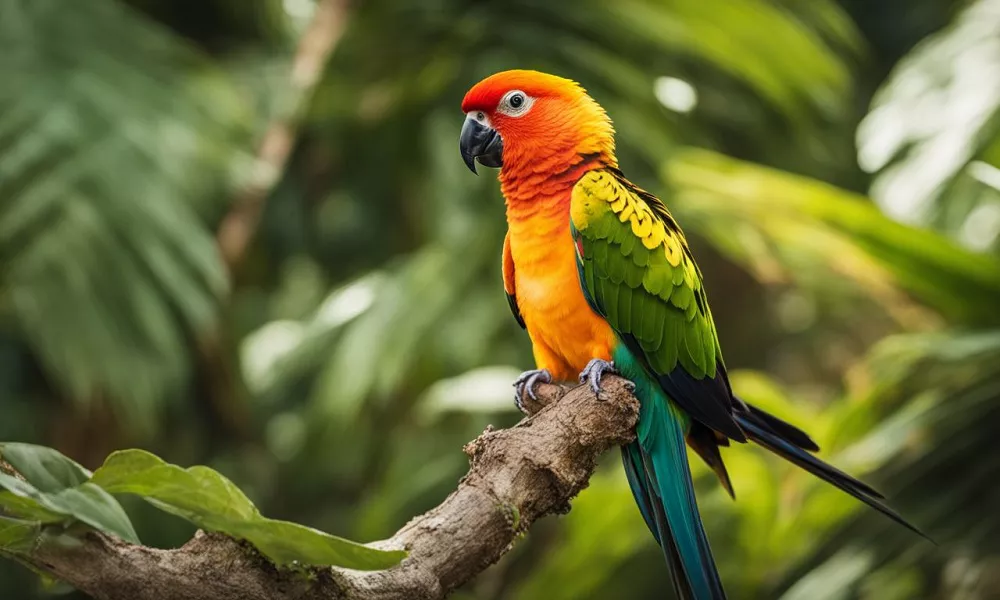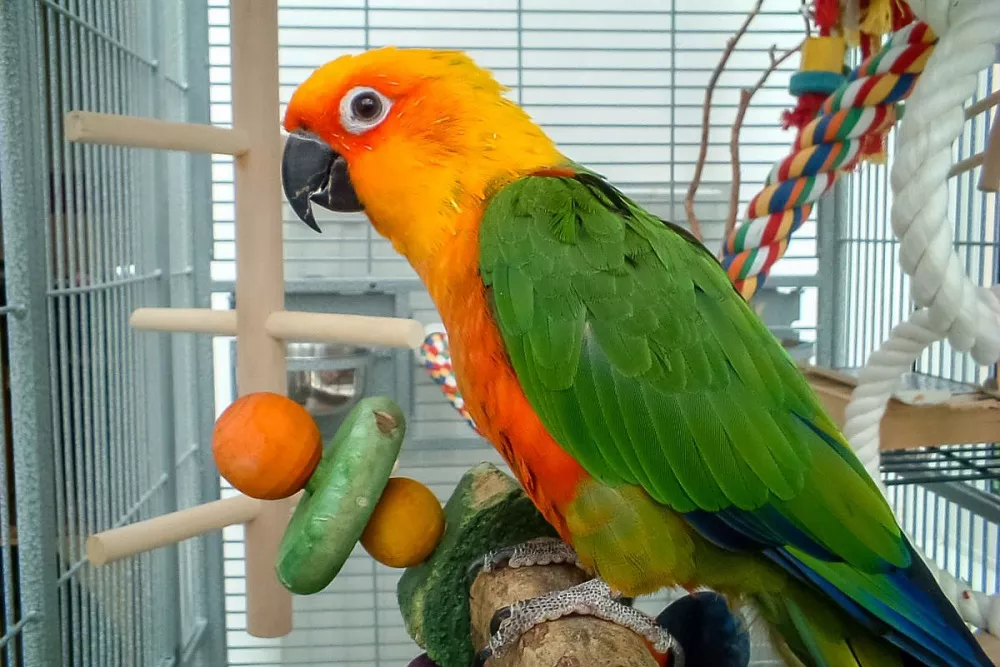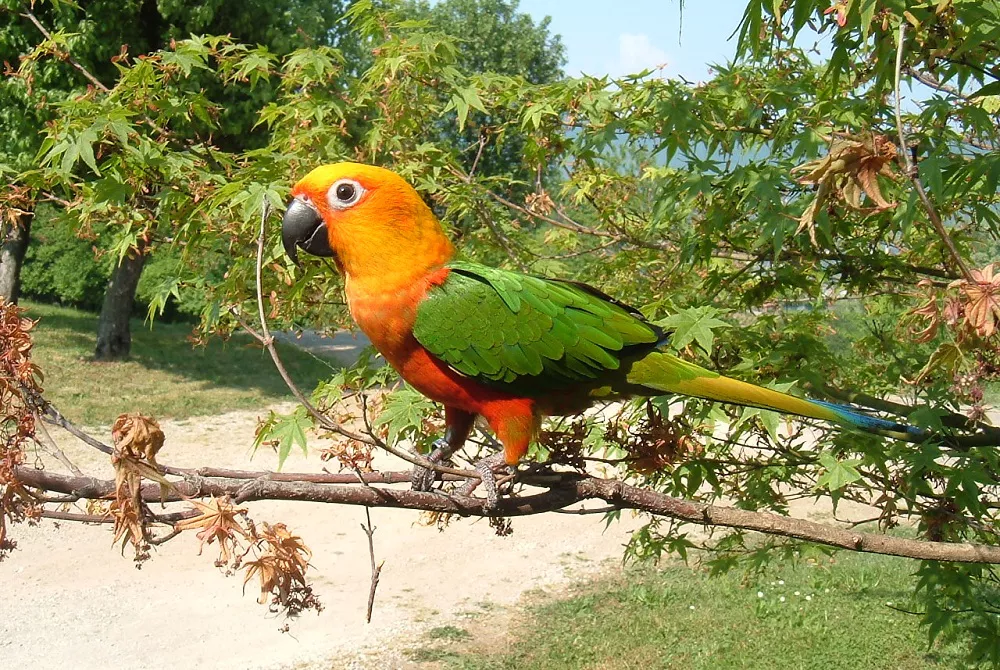The Jenday Conure (Aratinga jandaya), also known as the Jendaya Parakeet or Yellow-headed Conure, is a vibrant, intelligent, and affectionate medium-sized native to northeastern Brazil. Renowned for their colorful feathers, playful personalities, and ability to mimic human speech, Jenday Conures are a favorite among bird enthusiasts seeking a companion with a big personality in a compact body
Closely related to the Sun Conure, the Jenday has a green back and wings, orange-yellow head and body, and a long, tapered tail. Its personality and intelligence make it an engaging companion bird, but it also requires committed care.
The Jenday Conure Physical Characteristics
| Feature | Details |
| Scientific Name | Aratinga jandaya |
| Common Names | Jenday Conure, Jendaya Parakeet, Yellow-headed Conure, Flaming Parakeet |
| Size | 11.7–12 inches (28–30 cm) |
| Weight | 4.3–5.25 oz (125–150 grams) |
| Lifespan | 20–35 years |
| Native Region | Northeastern Brazil |
| Colors | Green wings, blue tail, orange-red body, yellow head and neck |
| Talking Ability | Limited, but can mimic simple words |
Jenday Conure Personality and Temperament
Jenday Conures are incredibly social and intelligent birds. They thrive on interaction and can form strong bonds with their human companions. Expect a bird that is:
- Playful and curious
- Cuddly, often enjoying snuggles
- Vocal, especially in the morning and evening
- Prone to separation anxiety if left alone for long periods
While they are affectionate, Jendays can also be a bit nippy if not properly trained or socialized. Early handling and positive reinforcement go a long way in shaping a well-behaved bird.
Jenday Conure Care
Cage Setup & Living Environment
To keep your Jenday Conure happy, provide a spacious cage (minimum 24″x24″x30″, but larger is always better. Bar spacing should be about 1/2 inch.) with horizontal bars for climbing. Essential features include:
- Multiple perches of varying widths
- Toys for mental stimulation (rotate them weekly)
- Foraging stations and puzzle feeders
- Clean water and nutritional food bowls
Let your conure out for 3–4 hours daily in a safe, bird-proofed room. They love flying and exploring, so supervised freedom is key.
Diet & Nutrition
A healthy diet is crucial. Feed a balanced mix of:
- Pellets (60–70% of diet)
- Fresh fruits (kiwi, apples) and vegetables (carrots, broccoli) (30%)
- Occasional treats like nuts, seeds, or millet spray
Avoid: chocolate, caffeine, avocado, alcohol, and salty or sugary foods.
Tip: Introduce new foods gradually and monitor droppings to track health.
Behavior and Training
Jenday Conures are highly intelligent and benefit greatly from training:
- Teach basic commands like “step up”
- Use positive reinforcement (treats, praise)
- Engage in clicker training for tricks
- Offer interactive toys and foraging puzzles
Training also helps curb undesirable behaviors like screaming or biting.
Health & Maintenance
Common Health Issues:
- Psittacosis
- Feather plucking (due to stress or boredom)
- Nutritional deficiencies
- Beak and feather disease (PBFD)
Routine Care:
- Trim nails monthly
- Clean cage weekly
- Regular vet checkups with an avian vet
- Monitor weight and feather condition
Is a Jenday Conure Right for You?
✅ Ideal For:
- Bird lovers with time for daily interaction
- Families or individuals seeking an affectionate, playful pet
- Owners willing to tolerate noise and invest in enrichment
🚫 Not Ideal For:
- First-time bird owners without research
- Those living in apartments with noise sensitivity
- People with little time at home
See Also: Are Jenday Conures Good Pets?
Jenday Conure Cost & Ownership
| Expense | Approximate Cost (USD) |
| Purchase Price | $400–$800 |
| Cage & Setup | $200–$500 |
| Monthly Food & Toys | $30–$60 |
| Annual Vet Care | $100–$300 |
Long-term commitment: 🕊️ 25+ years!
Jenday Conure vs Sun Conure
| Feature | Jenday Conure | Sun Conure |
| Head Color | Orange/Yellow | Bright Yellow |
| Wing Color | Green | Mostly Yellow |
| Noise Level | Very High | Very High |
| Personality | Nearly identical | Nearly identical |
Many owners can’t visually tell them apart — but the Jenday is often slightly more green.
Frequently Asked Questions
Q1. Are Jenday Conures good pets for families?
Yes, they are affectionate and social, making them suitable for families with children who can interact gently with birds.
Q2. How long do Jenday Conures live?
With proper care, they can live up to 30 years.
Q3. What do Jenday Conures eat?
A balanced diet of pellets, seeds, and fresh fruits and vegetables is ideal.
Q4. Do Jenday Conures talk?
They can mimic sounds and learn simple words, but are not known for extensive talking abilities.
Q5. How do I tell if my Jenday Conure is happy?
Signs include active play, vocalization, smooth feathers, and engaging behavior.
Conclusion
The Jenday Conure is a beautiful, intelligent, and loving companion for bird lovers willing to dedicate time and attention. With the right care, environment, and stimulation, these birds will reward you with years of joy and vibrant company.





 Facebook
Facebook  Instagram
Instagram  Youtube
Youtube 